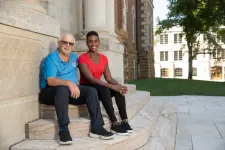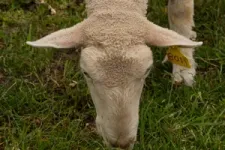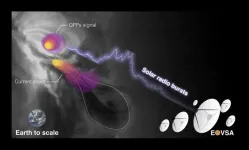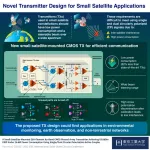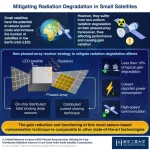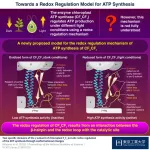(Press-News.org) University Professor Douglas Rhoads has been named a Fellow of the American Association for the Advancement of Science, the world’s largest general scientific society and publisher of the journal Science.
As one of only 20 fellows representing the Section on Agriculture, Food & Renewable Resources, Rhoads was chosen by his peers and colleagues for advancing science and its applications in service to society. The organization elected a total of 505 fellows across 24 scientific sections.
Rhoads is director of the Interdisciplinary Graduate Program in Cell and Molecular Biology, a graduate degree program he helped establish at the University of Arkansas. With 119 faculty from four colleges, Cell and Molecular Biology has grown into one of the largest doctoral programs on campus. His faculty appointment is in Fulbright College’s Department of Biological Sciences, and he is an affiliated faculty member in the Center of Excellence for Poultry Science.
Rhoads’ research has focused on genetics and genomics in a variety of species, including yeast, bears, tomatoes, fungi, rice, scorpions, snakes and bacteria. For many years, he has focused primarily on genetics and genomics of metabolic diseases of chickens. He has also published more than 80 scientific articles and reports on these topics.
Rhoads has won many teaching and research awards at the U of A. These include:
• Master Researcher Award, Fulbright College of Arts and Sciences, 2021
• Outstanding Graduate Mentor and Educator Award, Teaching and Faculty Support Center, 2019
• University of Arkansas Teaching Academy, 2018
• John Imhoff Award for faculty research publication, 2018
• Graduate School Outstanding Faculty Mentor Award, 2017
• Collis R. Geren Award for faculty commitment to graduate programs, 2017
• John Imhoff Award for faculty research publication, 2016
• Academic Advising Council Outstanding Faculty Advisor, 2012
As a teacher and mentor, Rhoads has had a significant impact on thousands of U of A students, including alumna Tameka Bailey, currently assistant professor in the Department of Biological Sciences.
“The ongoing mentorship that I received from Dr. Rhoads changed the trajectory of my life,” Bailey said. “He understood that as an underrepresented minority from rural Arkansas, I would need extensive and engaging mentorship to be successful in the program. He challenged me to excel in graduate school, and he had high expectations for me.
“After I graduated from the U of A, he helped me find my first job, advised me through my postdoc and has been instrumental in my career development now as a faculty member,” Bailey said “I wouldn’t be here without the generosity, wisdom and compassion of Dr. Rhoads.”
AAAS fellows are recognized for their extraordinary achievements across many disciplines. Examples of areas in which nominees may have made significant contributions are research, teaching, technology, services to professional societies, academic administration, industry, government, and communicating and interpreting science to the public. Fellows are elected annually by the AAAS Council from the list of approved nominations from the Section Steering Groups.
Rhoads received his bachelor’s and master’s degrees in biology at Wichita State University and his PhD at Kansas State University. He joined the U of A in 1990. In 2015, he rose to the rank of University Professor.
END
Douglas Rhoads named AAAS Fellow
University Professor Douglas Rhoads chosen by his scientific peers for one of the highest distinctions by advancing science and service to society.
2023-02-21
ELSE PRESS RELEASES FROM THIS DATE:
Pill for skin disease also curbs excessive drinking
2023-02-21
Researchers from Oregon Health & Science University and institutions across the country have identified a pill used to treat a common skin disease as an “incredibly promising” treatment for alcohol use disorder.
The study was recently published in the Journal of Clinical Investigation.
On average, the people who received the medication, called apremilast, reduced their alcohol intake by more than half — from five drinks per day to two.
“I’ve never seen anything like that before,” said co-senior author Angela Ozburn, Ph.D., associate professor of behavioral neuroscience in the OHSU School of Medicine and a research biologist ...
University of Ottawa physician is first Canadian winner of new award focused on health workforce wellness
2023-02-21
The University of Ottawa's Dr. Mamta Gautam is the first awardee of the AFMC Wellness Award, a new national honour that recognizes an individual in Canada who has shown dedication to the promotion and advancement of the wellness of physicians, medical students, and others.
“I am truly humbled and honoured. Promoting physician wellbeing is an area that I have been passionate about for over 30 years. To have the AFMC create an award to recognize contributions in this area lends further credibility to the importance of this topic,” ...
Researchers discover mysterious source of 'heartbeat-like' radio bursts in a solar fare
2023-02-21
A solar radio burst with a signal pattern, akin to that of a heartbeat, has been pinpointed in the Sun’s atmosphere, according to a new study.
In findings published in the journal Nature Communications, an international team of researchers has reported uncovering the source location of a radio signal coming from within a C-class solar flare more than 5,000 kilometers above the Sun’s surface.
Researchers say the study’s findings could help scientists better understand the physical processes behind the energy release of solar flares — the solar system’s most powerful explosions.
“The ...
Three talented researchers recognized as endowed chairs
2023-02-21
Huntsman Cancer Institute at the University of Utah (The U) is pleased to congratulate three of our newest endowed chairs. A chair appointment recognizes excellence, while providing academic distinction and funding for future research. Alana Welm, PhD, received a five-year extension in her current role as Ralph E. and Willia T. Main Presidential Endowed Chair in Cancer Research, Aik Choon Tan, PhD, was named the Jon and Karen Huntsman Presidential Professor in Cancer Research, and Brad Cairns, PhD, was named ...
New transmitter design for small satellite constellations improves signal transmission
2023-02-21
Today, there are many emerging applications for small satellite constellations, ranging from space-borne networks to environmental monitoring. However, small satellites have special needs when it comes to transmitter (TX) technology. For one, they have stringent limitations on power consumption as they draw energy from solar panels and cannot easily dissipate generated heat. Moreover, small satellites need to communicate with fast-moving targets that can be over a thousand kilometers away. Thus, they require efficient and precise beam steering capabilities to direct most of the transmitted power ...
Improving the performance of satellites in low Earth orbit
2023-02-21
A database updated in 2022 reported around 4,852 active satellites orbiting the earth. These satellites serve many different purposes in space, from GPS and weather tracking to military reconnaissance and early warning systems. Given the wide array of uses for satellites, especially in low Earth orbit (LEO), researchers are constantly trying to develop better ones. In this regard, small satellites have a lot of potential. They can reduce launch costs and increase the number of satellites in orbit, providing a better network with wider coverage. ...
Researchers uncover how photosynthetic organisms regulate and synthesize ATP
2023-02-21
ATP, the compound essential for the functioning of photosynthetic organisms such as plants, algae, and cyanobacteria, is produced by an enzyme called “chloroplast ATP synthase” (CFoCF1). To control ATP production under varying light conditions, the enzyme uses a redox regulatory mechanism that modifies the ATP synthesis activity in response to changes in the redox state of cysteine (Cys) residues, which exist as dithiols under reducing (light) conditions, but forms a disulfide bond under oxidizing (dark) conditions. ...
Sheep can benefit urban lawn landscapes and people
2023-02-21
Bicycles whirr by, students rush to class, staff and faculty are grabbing lunch or coffee on the go — and sheep graze the grassy knolls among the traffic, bleating every now and then. The grazing is their job.
The 25 wooly sheep who seasonally — for the past two years — leave their University of California, Davis, barns to nibble on lawns at various central campus locations, are doing much more than mowing, fertilizing and improving the ecosystem. The sheep also are improving people’s mental health.
The sheep — four breeds of Suffolk, Hampshire, Southdown and Dorset — first took on this role in 2021, when COVID-19 ...
UCLA Health tip sheet: Pesticides & Parkinson’s symptoms; Gender-affirming hormones tied to mental health for transgender youth; Body composition, not BMI, may signal risk for cardiovascular disease
2023-02-21
UCLA Health Tip Sheet Feb. 21, 2023
Below is a brief roundup of news and story ideas from the experts at UCLA Health. For more information on these stories or for help on other stories, please contact us at uclahealthnews@mednet.ucla.edu.
Body composition, not BMI, may signal risk for cardiovascular disease Body mass index has long been a measure of a person’s risk of developing cardiovascular disease, but body composition and its role in the disease have not been well studied. In a new study, ...
Better tools needed to determine ancient life on Mars
2023-02-21
ITHACA, N.Y. – Current state-of-the-art instrumentation being sent to Mars to collect and analyze evidence of life might not be sensitive enough to make accurate assessments, according to a research team co-led by a Cornell University astronomer.
In a paper published in Nature Communications, visiting planetary scientist Alberto Fairén, and an international team of researchers, claim that ancient organic material in Martian rocks could be difficult, if not impossible, to detect with current instruments and techniques.
Fairén – also a research professor at the Center ...
LAST 30 PRESS RELEASES:
How can you rescue a “kidnapped” robot? A new AI system helps the robot regain its sense of location in dynamic, ever-changing environments
Brainwaves of mothers and children synchronize when playing together – even in an acquired language
A holiday to better recovery
Cal Poly’s fifth Climate Solutions Now conference to take place Feb. 23-27
Mask-wearing during COVID-19 linked to reduced air pollution–triggered heart attack risk in Japan
Achieving cross-coupling reactions of fatty amide reduction radicals via iridium-photorelay catalysis and other strategies
Shorter may be sweeter: Study finds 15-second health ads can curb junk food cravings
Family relationships identified in Stone Age graves on Gotland
Effectiveness of exercise to ease osteoarthritis symptoms likely minimal and transient
Cost of copper must rise double to meet basic copper needs
A gel for wounds that won’t heal
Iron, carbon, and the art of toxic cleanup
Organic soil amendments work together to help sandy soils hold water longer, study finds
Hidden carbon in mangrove soils may play a larger role in climate regulation than previously thought
Weight-loss wonder pills prompt scrutiny of key ingredient
Nonprofit leader Diane Dodge to receive 2026 Penn Nursing Renfield Foundation Award for Global Women’s Health
Maternal smoking during pregnancy may be linked to higher blood pressure in children, NIH study finds
New Lund model aims to shorten the path to life-saving cell and gene therapies
Researchers create ultra-stretchable, liquid-repellent materials via laser ablation
Combining AI with OCT shows potential for detecting lipid-rich plaques in coronary arteries
SeaCast revolutionizes Mediterranean Sea forecasting with AI-powered speed and accuracy
JMIR Publications’ JMIR Bioinformatics and Biotechnology invites submissions on Bridging Data, AI, and Innovation to Transform Health
Honey bees navigate more precisely than previously thought
Air pollution may directly contribute to Alzheimer’s disease
Study finds early imaging after pediatric UTIs may do more harm than good
UC San Diego Health joins national research for maternal-fetal care
New biomarker predicts chemotherapy response in triple-negative breast cancer
Treatment algorithms featured in Brain Trauma Foundation’s update of guidelines for care of patients with penetrating traumatic brain injury
Over 40% of musicians experience tinnitus; hearing loss and hyperacusis also significantly elevated
Artificial intelligence predicts colorectal cancer risk in ulcerative colitis patients
[Press-News.org] Douglas Rhoads named AAAS FellowUniversity Professor Douglas Rhoads chosen by his scientific peers for one of the highest distinctions by advancing science and service to society.
